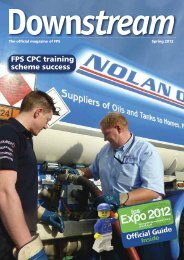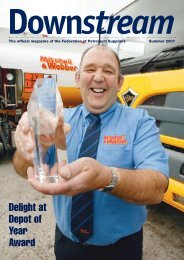Life and near-death for oilman in round - Downstream Magazine
Life and near-death for oilman in round - Downstream Magazine
Life and near-death for oilman in round - Downstream Magazine
You also want an ePaper? Increase the reach of your titles
YUMPU automatically turns print PDFs into web optimized ePapers that Google loves.
Environmental regulation<br />
Do I need a permit?<br />
BUSINESSES CONNECT WITH THE<br />
environment by either us<strong>in</strong>g natural<br />
resources <strong>for</strong> production processes <strong>and</strong>/or<br />
through emissions to l<strong>and</strong>, air <strong>and</strong> water.<br />
Sound environmental management of<br />
processes is a core bus<strong>in</strong>ess issue that can<br />
help promote a company's products <strong>and</strong><br />
services <strong>and</strong> improve its corporate<br />
st<strong>and</strong><strong>in</strong>g.<br />
Permits <strong>for</strong> discharge to public foul sewer,<br />
g<strong>round</strong>water <strong>and</strong> surface waters play a<br />
very important role <strong>in</strong> the environmental<br />
management of oil depots <strong>and</strong> petrol<br />
fill<strong>in</strong>g stations <strong>and</strong> <strong>for</strong> ensur<strong>in</strong>g they<br />
comply with the most recent legislation.<br />
However, the application procedure <strong>and</strong><br />
associated monitor<strong>in</strong>g of permits are often<br />
regarded as complex <strong>and</strong> difficult to<br />
comprehend. It doesn’t help that the<br />
Regulations change often, <strong>in</strong>clud<strong>in</strong>g<br />
changes of name <strong>and</strong> responsibilities.<br />
Do I need a permit?<br />
Clients often ask us if they need a permit<br />
<strong>for</strong> their site. Any discharges <strong>in</strong>to<br />
controlled waters (g<strong>round</strong>water, rivers,<br />
streams, ditches <strong>and</strong> estuaries) <strong>and</strong> the<br />
public foul sewer system, need a permit.<br />
This would <strong>in</strong>clude discharges to controlled<br />
waters through a pipe, dra<strong>in</strong>s, an open<br />
channel, an <strong>in</strong>filtration system or an oil<br />
separator. Only if the water is clean –<br />
surface run-off, <strong>for</strong> example, from a roof,<br />
road, pathway or clean hard st<strong>and</strong><strong>in</strong>g area<br />
– will you not need an environmental<br />
permit. In all other cases, you will need a<br />
permit from your local sewerage company<br />
or the Environment Agency.<br />
Discharges to public waste systems<br />
For discharges to the public foul sewer, the<br />
Water Industry Act 1991 states that any<br />
liquid produced as a result or as a part<br />
from any trade or bus<strong>in</strong>ess activity carried<br />
out on your trade premises qualifies as<br />
‘trade effluent’ <strong>and</strong> there<strong>for</strong>e requires<br />
consent from your local sewerage<br />
company.<br />
Discharges to controlled waters<br />
For discharges to controlled waters<br />
(g<strong>round</strong>water <strong>and</strong> surface waters), you<br />
need permission from the Environment<br />
Agency. The latest legislation<br />
PETER MULDER,<br />
Environmental<br />
Monitor<strong>in</strong>g Manager <strong>for</strong><br />
OHES Environmental,<br />
discusses how the<br />
Environmental<br />
Permitt<strong>in</strong>g Regulations<br />
<strong>in</strong>clud<strong>in</strong>g the recent<br />
amendments could<br />
affect your bus<strong>in</strong>ess<br />
(Environmental permitt<strong>in</strong>g Regulations<br />
2010) was <strong>in</strong>troduced <strong>in</strong> April 2010 <strong>and</strong> all<br />
consents <strong>and</strong> permits are now referred to<br />
as Environmental Permits.<br />
There are two different types of permits<br />
under EPR 2010: st<strong>and</strong>ard <strong>and</strong> bespoke, as<br />
well as the option to register <strong>for</strong> an<br />
exemption. As the name suggests,<br />
st<strong>and</strong>ard permits have fixed rules <strong>for</strong> very<br />
common activities. The application process<br />
is relatively simple <strong>and</strong> these permits often<br />
have lower fixed charges but are only<br />
available <strong>for</strong> a few <strong>in</strong>dustry types that can<br />
meet the requirements.<br />
Bespoke permits are written specifically <strong>for</strong><br />
a bus<strong>in</strong>ess activity <strong>and</strong> tend to be more<br />
complex <strong>and</strong> expensive. Most of the<br />
petrochemical <strong>in</strong>dustry, <strong>in</strong>clud<strong>in</strong>g the<br />
production of biodiesel, will require<br />
bespoke permits.<br />
F<strong>in</strong>ally, exemptions are <strong>for</strong> activities that<br />
don’t need a permit. Exemptions need to<br />
be registered <strong>and</strong> are generally free.<br />
Examples are some small effluent<br />
discharges (below 5 cubic metres per day<br />
<strong>for</strong> discharge to surface waters), as well as<br />
some farm <strong>and</strong> waste activities.<br />
Surface water dra<strong>in</strong>age systems<br />
Only clean, uncontam<strong>in</strong>ated surface water<br />
should go to the surface water dra<strong>in</strong>age<br />
system <strong>and</strong> no trade effluent or<br />
contam<strong>in</strong>ated water discharge should be<br />
made to this system. This <strong>in</strong>cludes vehicle<br />
washes <strong>and</strong> condensate from boiler<br />
systems. It is the site owner’s responsibility<br />
to ensure dra<strong>in</strong>s on his site are identified<br />
correctly <strong>and</strong> any trade effluent discharge<br />
directed to the foul sewer with the<br />
appropriate permit. Surface water run-off<br />
which may be contam<strong>in</strong>ated with oil, i.e.<br />
from load<strong>in</strong>g <strong>and</strong> unload<strong>in</strong>g areas or areas<br />
where tankers are parked up, should dra<strong>in</strong><br />
through an oil separator. The Environment<br />
Agencies publish guidel<strong>in</strong>es on the<br />
selection <strong>and</strong> <strong>in</strong>stallation of oil separators<br />
(PPG3). The subsequent discharge from the<br />
separator will require a permit. The permit<br />
is likely to <strong>in</strong>corporate quality conditions<br />
<strong>and</strong> it will be a crim<strong>in</strong>al offence to breach<br />
these conditions. It is essential there<strong>for</strong>e<br />
that the oil separator is <strong>in</strong>spected,<br />
ma<strong>in</strong>ta<strong>in</strong>ed, emptied (<strong>and</strong> refilled) on a<br />
regular basis <strong>and</strong> that the discharge from<br />
the separator is monitored to ensure<br />
compliance. Good housekeep<strong>in</strong>g can<br />
reduce ma<strong>in</strong>tenance <strong>in</strong>tervals <strong>and</strong> also<br />
m<strong>in</strong>imise the risk of a compliance failure.<br />
Environmental Monitor<strong>in</strong>g<br />
Permit holders are often encouraged to set<br />
up self-monitor<strong>in</strong>g programmes. This can<br />
help them monitor the whole process<br />
rather than just the end of the pipe,<br />
assist<strong>in</strong>g them with the early detection of<br />
problems <strong>and</strong> help<strong>in</strong>g to p<strong>in</strong>po<strong>in</strong>t the<br />
cause.<br />
The EPR 2010 regulations have put a<br />
greater emphasis on encourag<strong>in</strong>g<br />
operators to take responsibility. Greater<br />
emphasis is placed on management<br />
systems <strong>and</strong> us<strong>in</strong>g Environment Agency<br />
<strong>in</strong>dustry-specific guidance such as the ‘How<br />
to comply’ <strong>and</strong> Pollution Prevention<br />
Guidance.<br />
The bigger picture<br />
By <strong>in</strong>troduc<strong>in</strong>g Operator Self Monitor<strong>in</strong>g,<br />
the Environment Agency is mov<strong>in</strong>g to an<br />
audit<strong>in</strong>g role <strong>and</strong> will spend more time<br />
<strong>and</strong> resource <strong>in</strong>vestigat<strong>in</strong>g water quality<br />
problems. This could mean that any<br />
discharges, permitted or unpermitted, that<br />
cause deterioration are now more likely to<br />
be found out. Because the application <strong>and</strong><br />
compliance monitor<strong>in</strong>g of environmental<br />
permits can be a complex procedure <strong>and</strong>,<br />
with so much at stake, many companies<br />
choose to br<strong>in</strong>g <strong>in</strong> external consultants,<br />
such as the ex-regulatory specialists from<br />
OHES, to help ensure they get it right.<br />
MORE INFORMATION<br />
www.ohes.co.uk<br />
<strong>Downstream</strong> W<strong>in</strong>ter 2010 20 www.downstreammagaz<strong>in</strong>e.co.uk






